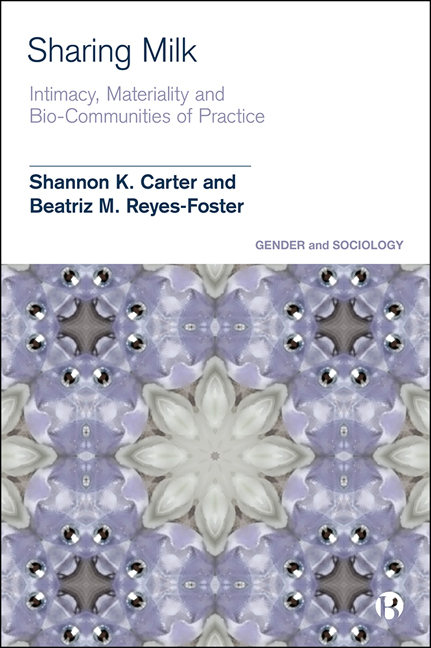Book contents
- Frontmatter
- Dedication
- Contents
- List of Figures and Tables
- Notes on the Authors
- Acknowledgements
- Preface
- 1 Introduction: Sharing Milk
- 2 Theorizing Milk Sharing
- 3 Entering Bio-Communities of Practice
- 4 Milk-Sharing Practices
- 5 The Milk-Sharing Network
- 6 Conclusion
- Notes
- Appendix A Survey Participant Demographics
- Appendix B Interview Participant Demographics
- References
- Index
2 - Theorizing Milk Sharing
Published online by Cambridge University Press: 10 March 2021
- Frontmatter
- Dedication
- Contents
- List of Figures and Tables
- Notes on the Authors
- Acknowledgements
- Preface
- 1 Introduction: Sharing Milk
- 2 Theorizing Milk Sharing
- 3 Entering Bio-Communities of Practice
- 4 Milk-Sharing Practices
- 5 The Milk-Sharing Network
- 6 Conclusion
- Notes
- Appendix A Survey Participant Demographics
- Appendix B Interview Participant Demographics
- References
- Index
Summary
I (Beatriz) met Anna in her modest apartment in Casselberry, a middleincome community in Central Florida. She opened the door holding six-month-old Grace, a beautiful baby girl with twinkling blue eyes. Anna was young, only 21, younger than most of the women who had participated in our study. When her baby girl was born, Anna was a single mother, working two minimum-wage jobs to support herself and her baby. Her story was harrowing: she explained that although she had been planning a vaginal birth, she experienced complications that led to a caesarean section (C-section). She qualified for Medicaid and thus had health insurance; however, like most women in the US, she did not have access to paid maternity leave, and her wages were very low. So, even though she was still physically recovering from major surgery, and even though her infant daughter was still very young, Anna had no choice but to return to work only 15 days after giving birth.
Anna firmly believes that human milk is the best possible nutrition for her baby. When Grace was born, nearly everything that could go wrong did go wrong: Grace was taken from Anna during the C-section and not returned to her for 90 minutes, despite Anna being promised that she would be able to have skin-to-skin contact with Grace in the operating room. Then Grace developed jaundice and had to be hospitalized. For four days, Anna slept in the hospital lobby, getting up every two hours to go to the NICU to nurse her baby.
Things got harder once Anna was able to bring Grace home. She knew federal law guaranteed her the right to express her milk, and that her employer was required to give her a space to do so. But she knew that because she held an unskilled job and worked for low wages her position was vulnerable. Her supervisor agreed to give her breaks so she could pump, but there was no space for her to do it at the gas station where she worked, so she had to do it in her car.
- Type
- Chapter
- Information
- Sharing MilkIntimacy, Materiality and Bio-Communities of Practice, pp. 35 - 62Publisher: Bristol University PressPrint publication year: 2020



